Along with the International Water Association (IWA), co-organisers of this event included BORDA, Germany - Bremen Overseas Research and Development Association, an organisation working towards the sustainable protection of natural resources, poverty alleviation and strengthening of social structures since 1977. BORDA aims to disseminate Basic Needs Services in the areas of decentralised sanitation,water and energy supply and solid waste disposal.
CDD – Consortium for DEWATS Dissemination Society, a programme partner of BORDA for implementation of decentralised basic needs services (DBNS) in South Asia was also a co-organiser for the event. CDD Society consists of 22 organisations in this region and is headquartered in Bangalore, India. It works to develop strategies and market Community-Based Sanitation (CBS) solutions, Decentralised Wastewater Treatment Systems (DEWATSTM) and Solid Waste Management (SWM).
This event was also supported by GIZ – Deutsche Gesellschaft für Internationale Zusammenarbeit (GIZ) GmbH and the National Environmental Engineering Research Institute (NEERI), based in Nagpur. GIZ is an initiative of the German government which works in the field of international cooperation for sustainable development. NEERI is a research institute under the Council of Scientific and Industrial Research (CSIR), India. The research divisions of NEERI span a breadth of environmental disciplines such as water treatment technology, wastewater treatment, environmental materials, air pollution, solid waste management, genomics and environmental biotechnology.
This conference was the fourth in a series of events organised by the IWA in Asia focusing on decentralised wastewater treatment systems. Its central theme was to develop the concept of DEWATS on a number of topics arising from the previous conferences namely, the “Sanitation Options” Conference in Hanoi, 2008; the "DEWATS in Developing Countries" Conference in Surabaya, 2010 and the "DEWATS for Urban Environments in Asia" Conference in Manila, 2011. This was the first time that IWA chose to focus on DEWATS from a management point of view rather than simply from a design or technology point of view.
What is DEWATS?
Decentralised Wastewater Treatment Systems or DEWATS is a low-maintenance approach which aims to treat municipal wastewater in communities where centralised sanitation facilities are absent or have failed. DEWATS provides reliable and robust wastewater treatment systems at affordable prices using locally available materials.
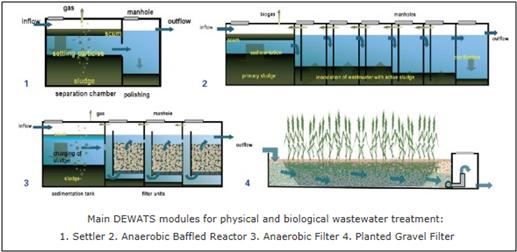
Image source: BORDA
The Conference
Keynote speeches
The key note was delivered by Ms. Susmita Sinha, the current Director of Training, Knowledge Management and Research & Development with CDD Society. Ms. Sinha has over 14 years of experience in urban environmental management and applied research activities related to monitoring and analysis, especially in the field of decentralised sanitation services. In her presentation titled 'Coverage, delivery and development – urban sanitation challenges', Ms. Sinha set the theme of the conference by highlighting key aspects of sustainable development and equality and what steps are needed to ensure a balance between ecological and social equality, something that India lacks.
At the moment, India is behind target in providing sanitation for its people because of the challenge of providing sanitation in urban areas. This challenge is made more complex because of rapid urbanisation. Inflexible consumption patterns make it more difficult to change community behaviour. Further, it is at times unclear who is responsible for providing sanitation. Thus, there are no standard solutions to these compounded urban problems. She concluded by highlighting that centralised sanitation cannot provide a solution to these issues alone. Different technologies have to work hand in hand and decentralised approaches can complement centralised solutions to solve India’s urban challenges.
The second keynote was delivered by Dr. Stefan Reuter, the Director of BORDA, on the increasing focus on water and sanitation as a basic human right and various water and sanitation (WATSAN) initiatives of BORDA in collaboration with for-profit, non-profit and academic organisations. Dr. Reuter talked about the story of sanitation starting in Rome, where aqueducts first introduced the concept of linear water streams and mixing of the water and nutrient cycle. He then moved to Edo, the former name of Tokyo, where nearly 400 years ago, waste was dumped onto agricultural land for use as fertilisers, thus saving the rivers and streams from anthropogenic contamination.
He described the efforts of BORDA in piloting and dissemination of self-sustainable basic services and how experiences from Asian countries with anaerobic digestion technology and production of biogas can provide solutions to the water and sanitation crisis currently faced in several parts of the world. He highlighted some of the benefits of DEWATS, like for instance DEWATS can be implemented in regions where electrical infrastructure is not available and proper operation and maintenance (O&M) cannot be ensured. These systems can withstand variations in organic and hydraulic loading as well as extremely high or low temperature conditions, and could contribute to infrastructure optimisation by pre-treating stormwater and ensuring treatment closer to the point of discharge.
He concluded by mentioning a call for responsibility to connect the society, businesses administration and academia to act and develop solutions to the present crisis. He raised some pertinent questions as to how we can enable robustness and capacity of our cities and towns; develop cooperation and economic rationale, organise priorities, direct investment and renovate policies and develop our inner convictions towards becoming actors of change in the present urban sanitation scenario.
Presentations
The presentation sessions of the conference were divided into the following thematic groups - Technological Developments, Policies, Standards and Regulations; Stakeholder Engagement; Planning; Design & Construction; Management; Ensuring Sustainability and Financing.
There were a total of three sessions on Technological Developments, with 11 speakers from 7 countries. The primary focus was to share experiences of practitioners and researchers in DEWATS from different parts of the world, especially in developing countries. It included presentations on the potential of natural technologies for decentralised wastewater management in India such as subsurface flow constructed wetlands, planted filters, duckweed ponds and waste stabilisation ponds. Studies discussing the assessment of the success and feasibility of these technologies in Asian countries such as India, Nepal and Indonesia were looked at, specifically from a technical, financial and managerial perspective.
An important aspect of DEWATS which was highlighted during these sessions was the potential for generation of biogas from anaerobic digesters and the importance of source separation which basically means separating liquid and solid toilet wastes as well as separating blackwater (urine, excreta etc.) from greywater (wastewater from the sink, kitchen etc.). Research on new materials for wastewater treatment such as coco peat, coconut fiber and nutrient removal by algae culture was also presented.
In the sessions on Design and Construction, similar discussions were held on standardising the design of DEWATS systems to increase their efficiency. A standardised design process helps engineers to avoid an elaborate design procedure, especially in times of emergency. A post-tsunami experience from Tamil Nadu was presented in the Management session to illustrate the importance of DEWATS in a state of emergency. Various gaps in the DEWATS programme also came to light, such as lack of involvement of the local government, ambiguity among the community members with respect to operation and maintenance due to lack of information. Discussion on the successes and failures of different case studies would prove useful in up-scaling and disseminating DEWATS, especially in developing countries.
The sessions on Policies, Standards & Regulations focussed on experiences where decentralised wastewater treatment systems have been included in the legal framework at the local or national level. Instances from Afghanistan depict how decentralised treatment systems have been incorporated into the infrastructure in the post-Taliban era. Policy-makers presented experiences of incorporating DEWATS into their country's water and sanitation laws. A case study from Thane depicted how attempts made by Thane Municipal Corporation have been successful in bridging the gap in sanitation facilities created due to increasing population and limited funds.
The importance of community engagement was further enforced in the various talks in the Stakeholder Engagement session. Active participation of the community which will use and maintain the DEWATS system is essential toward ensuring its sustainability. It also helps in capacity building at the local level as locals would not be dependent on external agencies for the upkeep of their sanitation facility.
A 7-step approach toward sustainable DEWATS was discussed:
Project management -> Baseline assessment -> Identification of user preferences and workshops for experts -> Informing stakeholders -> Selection of feasible combinations of technologies -> Plan development and finalizing -> Implementation
It is also clear from various DEWATS experiences that if the users have a sense of ownership towards the treatment system, higher success rates can be achieved. This can be achieved by charging them a minimal, affordable fee and making them a part of the planning phase.
The session on Ensuring Sustainability presented success stories in which DEWATS systems are being successfully operated and also shed light on the kind of problems that a DEWATS project can run into. For example, problems with community participation, lack of interest and cooperation by city authorities. A case study from Bangladesh presented lessons from such a project where community involvement and awareness programs have led to a decrease in open defecation and consequently, lesser incidence of disease.
In an extensive study depicting monitoring results of 108 DEWATS projects from Indonesia, survey responses were presented in an attempt to understand which factors, social and technical, affect the performance of a DEWATS system. For example, prior training to users, no. of people connected to DEWATS system, frequency of loading, whether continuous or intermittent loading, exposure to stormwater etc. These surveys would contribute significantly to the body of knowledge regarding DEWATS.
Field Study
A field study was conducted for the conference participants to the DEWATS site at the Vocational Training Centre in Lonara, Nagpur. This visit was organised to highlight the concept of DEWATS in an institutional setup and also as a technical option in an area with water scarcity under difficult soil conditions.
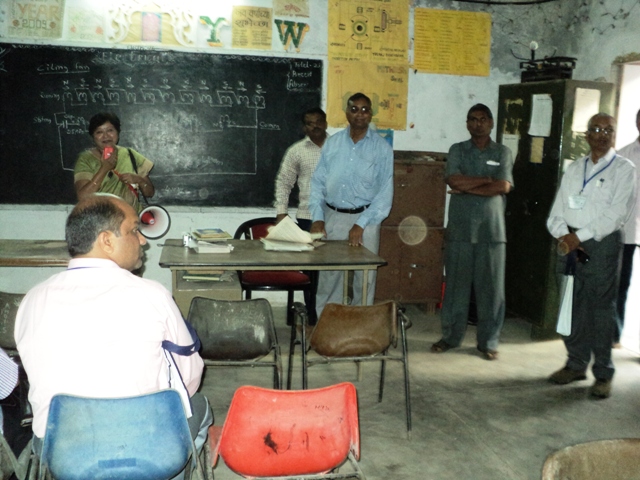
Ms. Vijaya Shah, Director of Indian Institute of Youth Welfare, giving a talk at the Lonara Vocational Training Centre
The Vocational Training Centre at Lonara comprises of a training centre and hostels, accommodating around 110 persons. In order to overcome the water shortage problem and also to demonstrate the treatment and reuse of sewage, the DEWATS unit has been implemented by the Indian Institute of Youth Welfare, Nagpur. This project was funded by BORDA, and CDD provided technical support in design and implementation.
The DEWATS system treats 20 m3 of wastewater generated at the training facility. It consists of three treatment units connected in series: a primary settler, an anaerobic baffle reactor (ABR) which acts as the secondary treatment unit and a planted gravel filter that provides tertiary treatment. Finally, the treated effluent is collected in a tank from which it can be reused for gardening and horticulture. The sludge is used as compost. The effluent quality indicates an organic load reduction of 80%. No odour problems were detected during this visit.
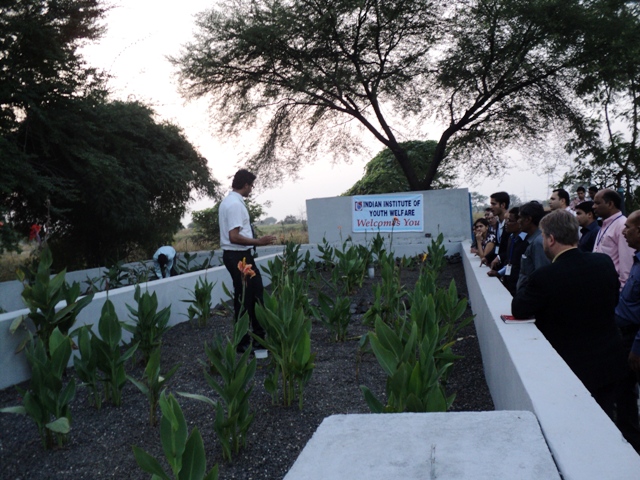
Planted gravel filter constructed on top of the primary settling tank
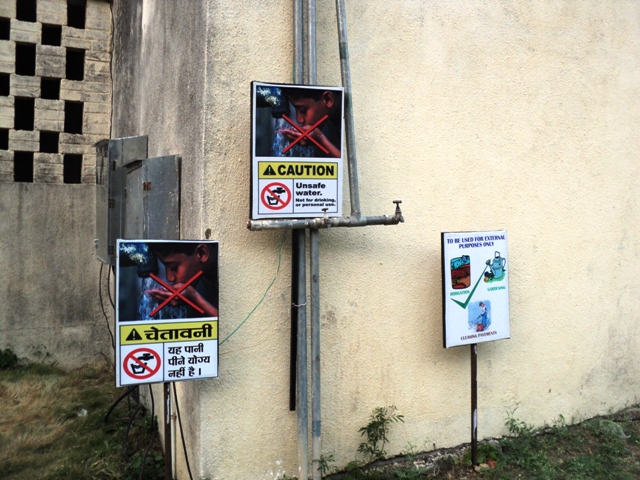
Signs cautioning against drinking the wastewater near the treatment facility
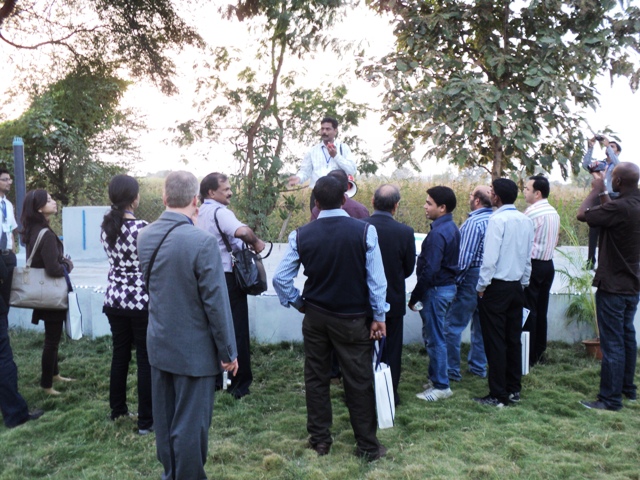
Conference participants standing near the underground anaerobic baffled reactor
/articles/report-international-conference-decentralised-wastewater-management-held-november-20-22